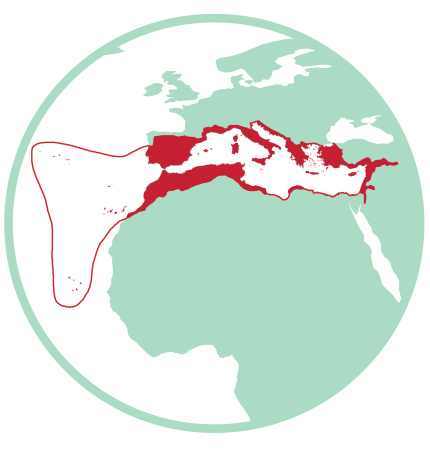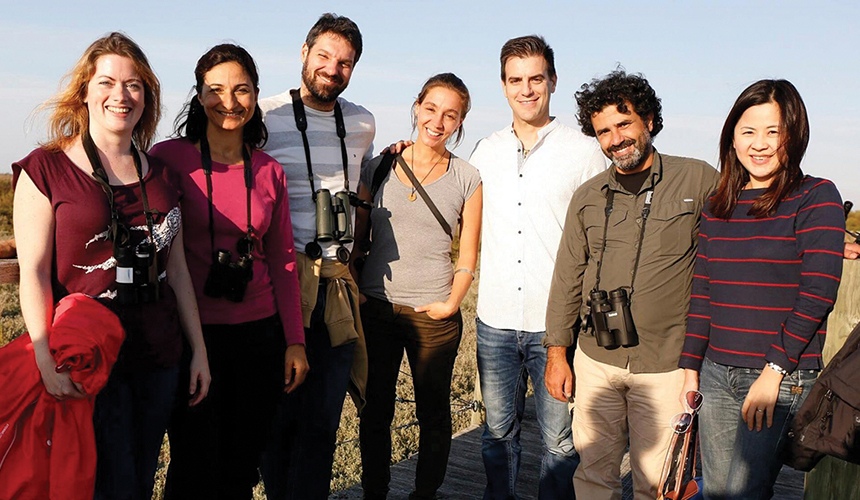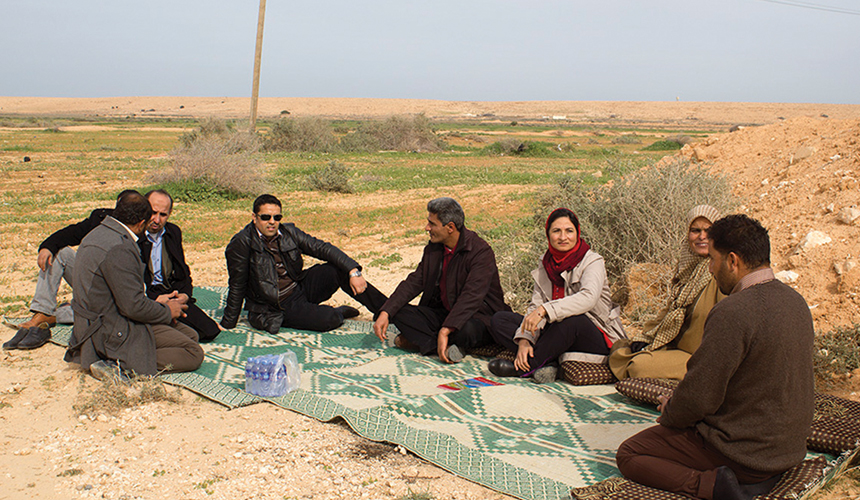Regional implementation teams: Making connections that build lasting conservation
In every biodiversity hotspot where CEPF invests, it establishes a regional implementation team (RIT). These groups of experienced conservationists play a crucial role, providing strategic local leadership and working with CEPF staff to convert the strategy in each hotspot’s ecosystem profile into a cohesive portfolio of grants that conserves biodiversity and strengthens local civil society.
Each RIT is tailored to the needs of the hotspot and can be made up of one or more civil society organizations that are active in conservation in the region. For the duration of the CEPF investment, these teams represent CEPF in the hotspot, providing local knowledge and building a broad constituency of civil society groups working across institutional and political boundaries toward achieving the objectives described in the ecosystem profiles.
Mediterranean Basin Biodiversity Hotspot

One example of a regional implementation team that’s helping CEPF build lasting conservation is CEPF’s Mediterranean Basin team, which is made up of staff from BirdLife International and its national partners Ligue pour la Protection des Oiseaux (LPO)/BirdLife France and Društvo za opazovanje in proučevanje ptic Slovenije (DOPPS)/BirdLife Slovenia. The team includes a manager and program officers in three subregions: the Balkans, the Middle East and North Africa.

The RIT was in place for CEPF’s first investment in the hotspot—US$10.7 million in grants awarded in 12 countries from 2012 to 2017—and has continued in the role for CEPF’s second investment of US$10 million, which continues through 2022.
“The structure of the Mediterranean RIT reflects the complexity of the hotspot—many different cultures and countries. It is important for this team to understand the languages, politics and cultural issues of the hotspot,” said Pierre Carret, who oversees the RIT as the CEPF grant director for the Mediterranean Basin.
Like all RITs, the Mediterranean Basin team works closely with its CEPF grant director to issue calls for proposals, review proposals and help grantees adjust their projects to meet the requirements for CEPF grant funds. Those funds may take the form of large grants that are administered by CEPF, or small grants which, for the Mediterranean Basin, are currently capped at US$20,000. The RITs are in charge of administering the small grants.
The Mediterranean Basin team also gets help from its advisory committee, which includes scientists and representatives of donors and nongovernmental organizations working in the region.
Empowering local organizations
Once grants are awarded, the RIT works with the CEPF grant director to make sure the funded projects are on track. “During the whole life of a grant, the RIT is there for the grantees. The program officers will go out of their way to go and see them, visit the sites, and they’re very much there to be a sounding board as well,” said Liz Smith, the Mediterranean Basin RIT manager.
Borut Rubinic, program officer for the Balkans, describes working closely with grantees as the best part of the job, and he said he appreciates the opportunity the small-grants program gives the RITs to build up local organizations. “We can be more supportive to small, local grassroots organizations that know these areas well but need some push in terms of administrative, technical or organizational capacities,” he said.
Another key role for the RIT is making connections. Linking small grants with large grants is very important to the success of the investment, according to the team.
“We will connect grantees with one another. We’ve had partners in projects teaming up in lots of collaborations, in transboundary projects. There have been grantee exchanges,” said Smith. “We’re looking over a lot of different countries, a lot of different themes. We’re in a very unique place to be able to put people together, and that’s really important.” One example is a new partnership between Libyan and Jordanian grantees that was facilitated through an exchange visit funded by CEPF. The newly established organizations Libyan Wildlife Trust and Oxygen visited Jordanian organization Sweimeh Association Charity and other groups to learn about their experience in nature conservation and ecotourism. The participants remain in contact, exchanging views and seeking guidance on conservation actions.

Providing a bridge between government and civil society is also important, setting the stage for a mutually beneficial, long-term relationship that can help countries achieve commitments to international agreements such as the U.N. Convention on Biological Diversity. “Reaching their national targets is a real challenge for many countries, and civil society can help solve this through innovative approaches and specialized expertise,” Smith said.
In turn, civil society is given the opportunity to prove to the local and national government that they have the experience and ability to carry out the work.
“During the first investment, we found that CEPF being in the region gave the grantees a voice,” Smith said. “We were visiting quite high-level people in the government, in the ministries, and so when we were there, we would be talking about the projects and the organizations.”
Building on what they learned during the first investment phase, and the networks and connections they established, the Mediterranean Basin RIT team will continue to support and grow civil society’s capacity in order to protect the region’s biodiversity.
“I strongly believe that civil society organizations are the key in delivering the ambitious global biodiversity goals,” said Smith. “This is how we will ensure we leave a legacy.”
Learn more about what CEPF grantees achieved in the Mediterranean Basin during CEPF’s first investment on pages 27 and 28.
CEPF’s Ecosystem Profiles
When CEPF’s Donor Council approves investment in a biodiversity hotspot, CEPF commissions the development of an ecosystem profile: an analysis of the biodiversity and socio-economic conditions in the hotspot and a regional conservation strategy, which is produced by, and in consultation with, local stakeholders. This document guides CEPF’s investment in the hotspot.
Find the Mediterranean Basin Ecosystem Profile at www.cepf.net/MediterraneanBasin.
Photo Credits
Mediterranean Basin RIT team members, from left, RIT Manager Liz Smith, Program Officer for North Africa Awatef Abiadh, Program Officer for the Balkans Borut Rubinic, Program Officer for Cabo Verde Mariana Carvalho, Senior Conservation Advisor Iván Ramírez, Program Officer for the Middle East Sharif Jbour, and Small-Grants Administrator Serena Loh-Cornell. © Conservation International/photo by Pierre Carret
North Africa Program Officer Awatef Abiadh, third from right, meets with civil society representatives in Libya. © CEPF Med



